Table of Contents[Hide][Show]
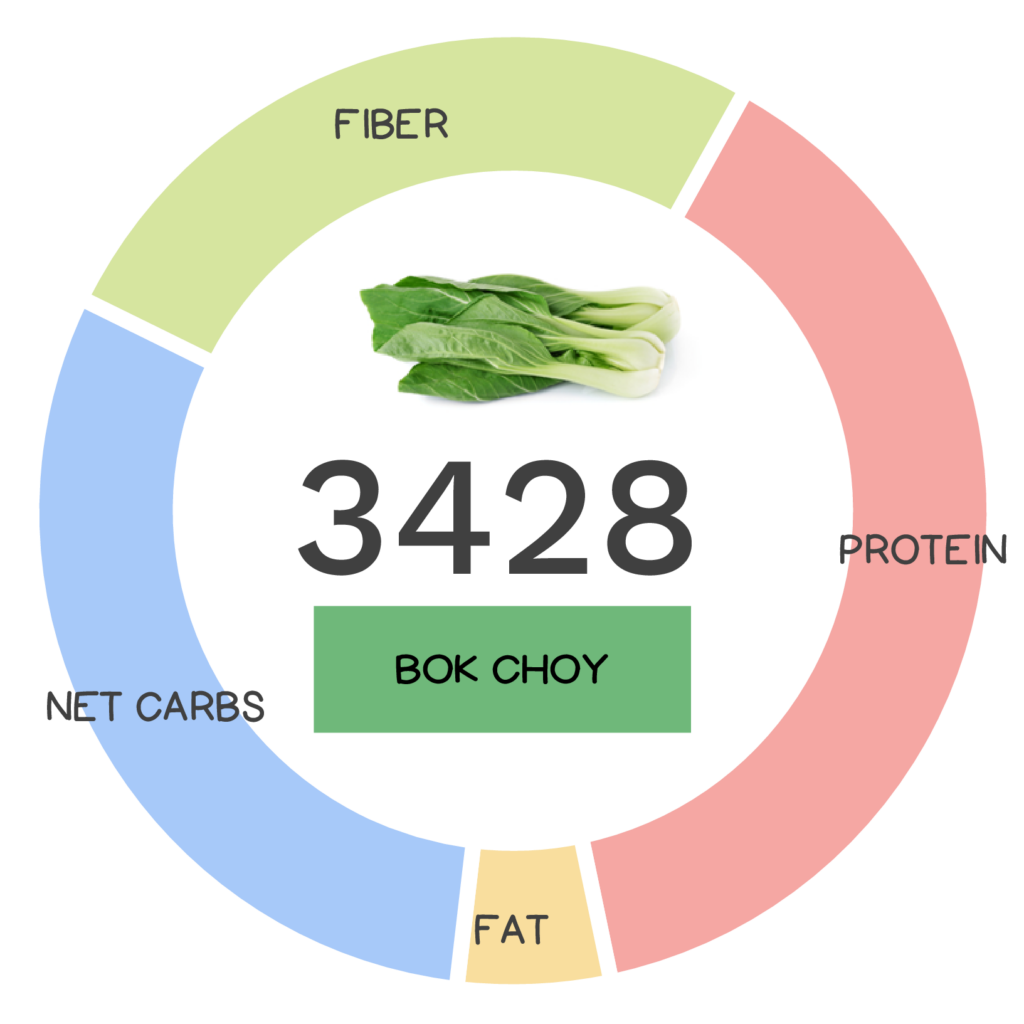
A staple in Asian cuisine, bok choy is a leafy cruciferous vegetable, chock-full of nutrition, worthy of world-wide acceptance. Known by many different names including bok choi, pak choi, pak choy, pok choi, Chinese chard, Chinese mustard, Chinese white cabbage, celery mustard, spoon cabbage (in reference to the shape of its leaves), or for those of us who are science nerds Brassica rapa chinensis, the name bok choy is actually Cantonese for “white vegetable.” (It may also sometimes be referred to by the general term ‘Chinese cabbage’, however, this may lead to confusion since this term actually refers to both bok choy and Napa cabbage). No matter what you call it, this nutrient-dense veggie is worth adding to your diet! Once you’ve tried it, you’ll keep coming “bok” for more!
Bok choy is a member of the cruciferous vegetable family, which also includes broccoli, Brussels sprouts, cabbage, cauliflower, collard greens, and kale.
Bok choy is a member of the cruciferous vegetable family, Brassicaceae, which also includes broccoli, Brussels sprouts, cabbage, cauliflower, collard greens, and kale to name a few. Other family members which are cultivars from the exact same Brassica rapa species as bok choy include napa cabbage, rapini, and turnips. This Asian green is in fact a type of cabbage that doesn’t form heads; instead, the veggie ends in dark green leaf blades that are quite similar to mustard greens (another member of the cabbage family). There are two main types of bok choy: traditional true bok choy and Shanghai bok choy. The traditional form has dark green, crinkly leaves with white stems, crisp in texture, while the Shanghai variety has light green spoon shaped leaves with stems that are jade green. Bok choy originated in China, where it has been cultivated since the 5th century AD. Today, it is grown in many other temperate parts of the world due to its cold weather hardiness. In Singapore, where vertical farming has become popular, this veggie is grown in 30-foot-tall towers!
Learn What Foods to *ADD* to Your Diet
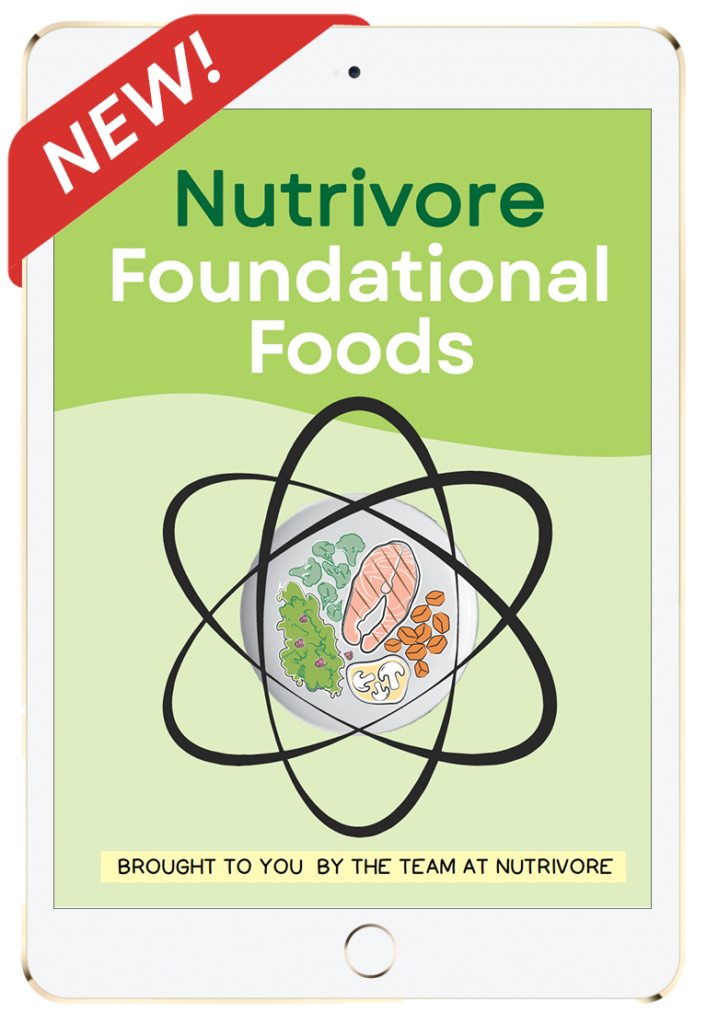
Nutrivore Foundational Foods
Learn what makes the 12 Nutrivore foundational food families nutritionally unique, their health benefits, which options are the most nutrient dense, how much of them to eat, plus various fun facts, practical pointers, and busting of common myths.
This very helpful resource will introduce you to new foods and expand your nutrition knowledge, making food choices easier!
Buy now for instant digital access.
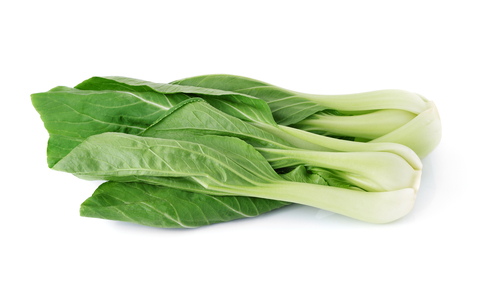
Nutrivore Score for Bok Choy – 3428
Bok choy has a Nutrivore Score of 3428, making it a super nutrient-dense food! Plus, it is a low-carb and low-calorie-density food; the calorie count of bok choy is just an amazing 9 calories per cup!
Per serving, bok choy is a best source (>50% daily value) of glucosinolates; an excellent source of carotenoids, polyphenols, vitamin C and vitamin K; and a good source (10-20% daily value) of vitamin A and vitamin B9 (folate).
Ditch Diets. Embrace Nutrients. Start with this FREE Guide.
Sign up for the free Nutrivore Newsletter, your weekly, science-backed guide to improving health through nutrient-rich foods — without dieting harder —and get the Beginner’s Guide to Nutrivore delivered straight to your inbox!

Bok Choy Nutrition Facts
One serving of bok choy is standardized to 1 cup of bok choy, shredded, or about 70 grams (2.5 ounces). For reference, on average one head of bok choy is 840 grams (or 12 servings). When you cook bok choy, it loses volume: 1 cup of raw bok choy is equivalent to a little less than 1/2 cup boiled bok choy.
Bok Choy Nutrition Facts Per Serving
| Bok choy, raw | Nutrivore Score: 3428 | Nutrient Density: Super! |
|---|---|---|
| Serving Size: 1 cup, shredded (70 grams) | Protein: 1.1 grams | Net Carbohydrates: 0.8 grams |
| Calories: 9 | Total Fat: 0.1 grams | Dietary Fiber: 0.7 grams |
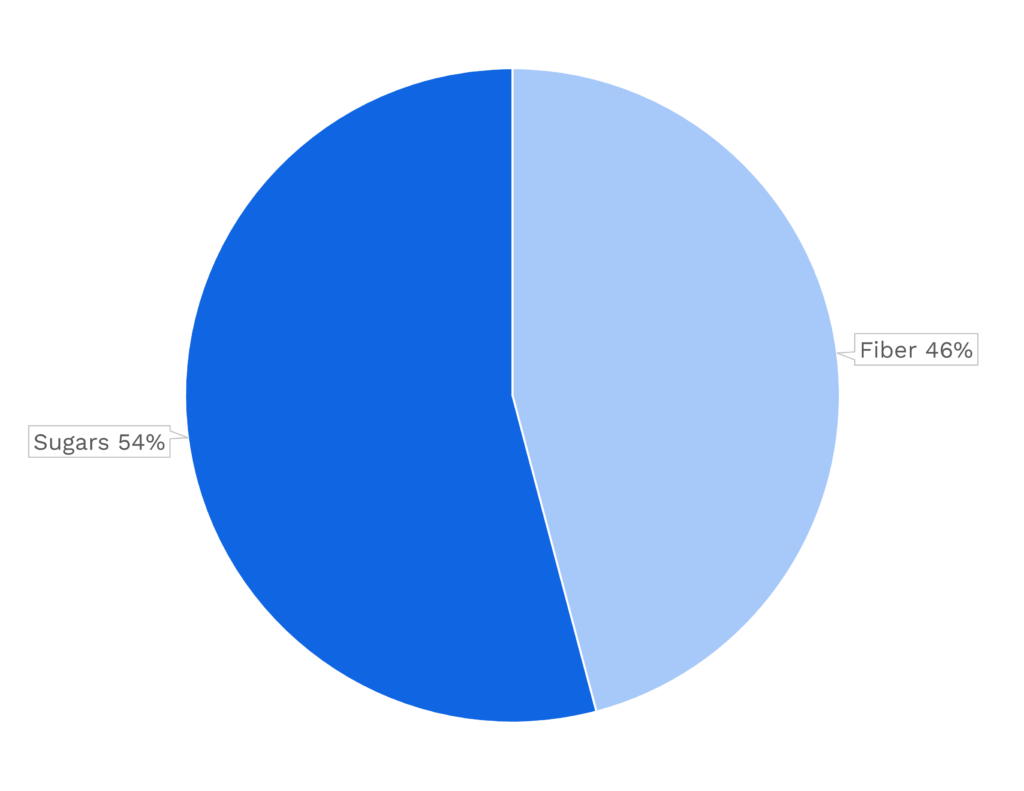
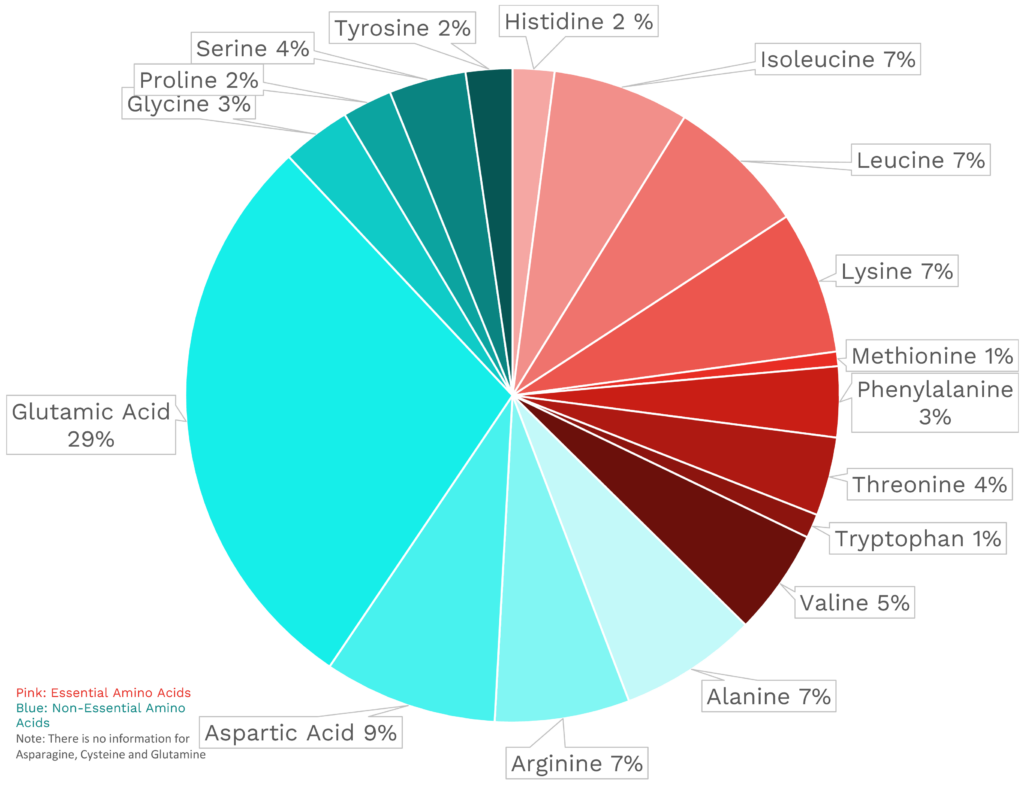
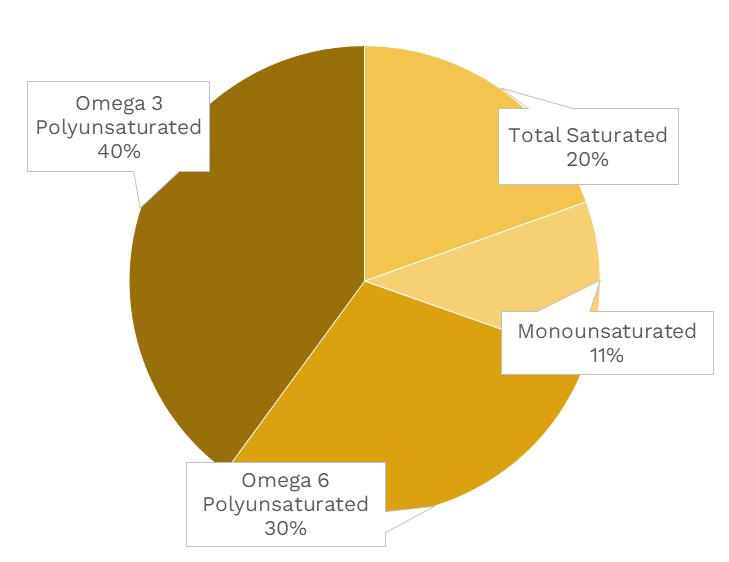
| VITAMINS | ||
|---|---|---|
| Vitamin A | 156.1 μg RAE | 17% DV |
| Vitamin B1 (Thiamin) | 28.0 μg | 2% DV |
| Vitamin B2 (Riboflavin) | 49.0 μg | 4% DV |
| Vitamin B3 (Niacin) | 0.4 mg | 2% DV |
| Vitamin B5 (Pantothenic Acid) | 0.1 mg | 1% DV |
| Vitamin B6 (Pyridoxine) | 135.8 μg | 8% DV |
| Vitamin B7 (Biotin) | 1.9 μg | 6% DV |
| Vitamin B9 (Folate) | 46.2 μg | 12% DV |
| Vitamin B12 (Cobalamin) | 0.0 μg | 0% DV |
| Vitamin C | 31.5 mg | 35% DV |
| Vitamin D (D2 + D3) | 0.0 μg | 0% DV |
| Vitamin E | 0.1 mg | 0% DV |
| Vitamin K | 31.9 μg | 27% DV |
| Choline | 4.5 mg | 1% DV |
| Myo-Inositol | 18.9 mg | ~ |
| CoQ10 | 0.3 mg | ~ |
| FUNCTIONAL FATS | ||
|---|---|---|
| MUFA | 0.0 g | 0% DV |
| ALA | 38.5 mg | 2% DV |
| EPA + DHA | 0.0 mg | 0% DV |
| CLA | ~ | ~ |
| Linoleic Acid | 0.0 g | 0% DV |
| MCT’s | 0.0 g | ~ |
| MINERALS | ||
|---|---|---|
| Calcium | 73.5 mg | 6% DV |
| Copper | 14.7 μg | 2% DV |
| Iodine | ~ | ~ |
| Iron | 0.6 mg | 3% DV |
| Magnesium | 13.3 mg | 3% DV |
| Manganese | 111.3 μg | 5% DV |
| Phosphorus | 25.9 mg | 2% DV |
| Potassium | 176.4 mg | 4% DV |
| Selenium | 0.4 μg | 1% DV |
| Sodium | 45.5 mg | 2% DV |
| Zinc | 0.1 mg | 1% DV |
| PHYTONUTRIENTS | ||
|---|---|---|
| Carotenoids | 1905.4 μg | ~ |
| Polyphenols | 187.6 mg | ~ |
| Phytosterols | 8.9 mg | ~ |
| Glucosinolates | 70.7 mg | ~ |
| Thiosulfinates | ~ | ~ |
| Betalains | ~ | ~ |
| AMINO ACIDS & PEPTIDES | ||
|---|---|---|
| Taurine | ~ | ~ |
| Ergothioneine | ~ | ~ |
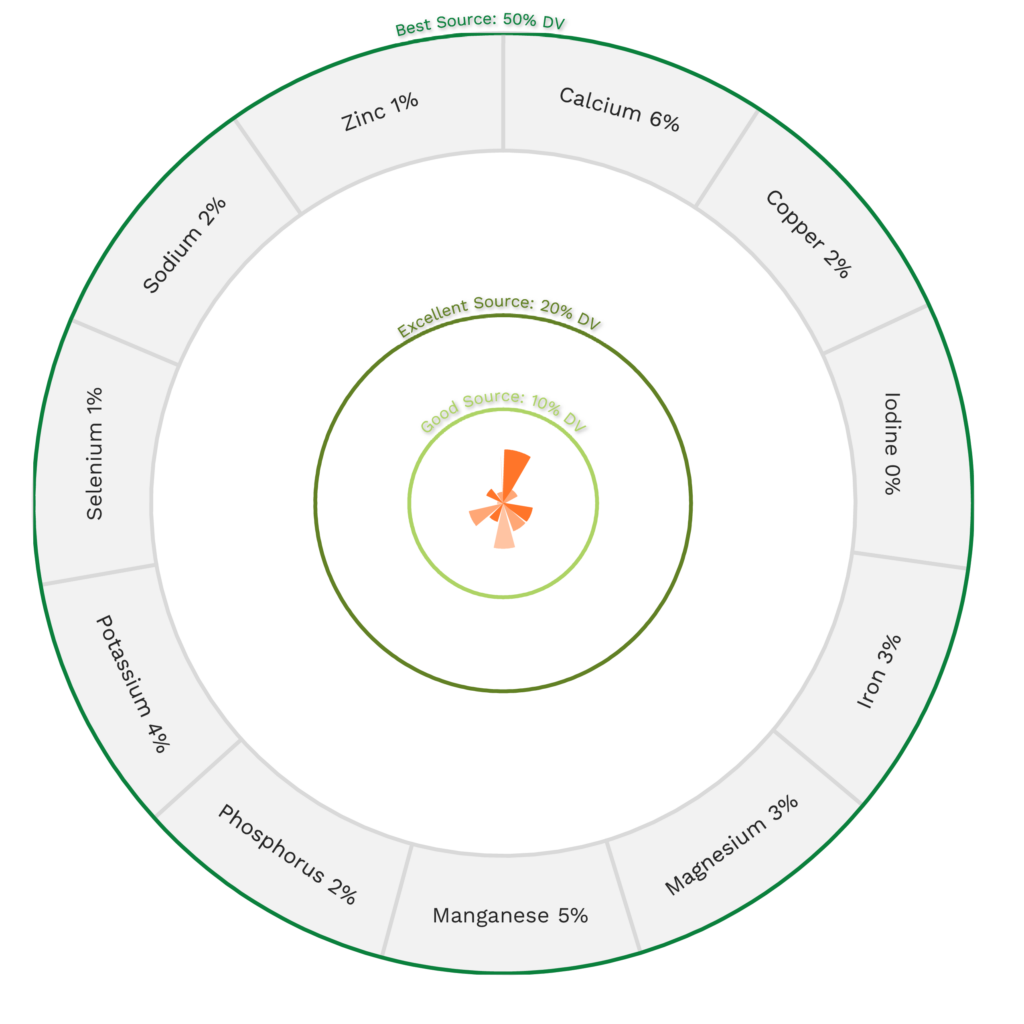
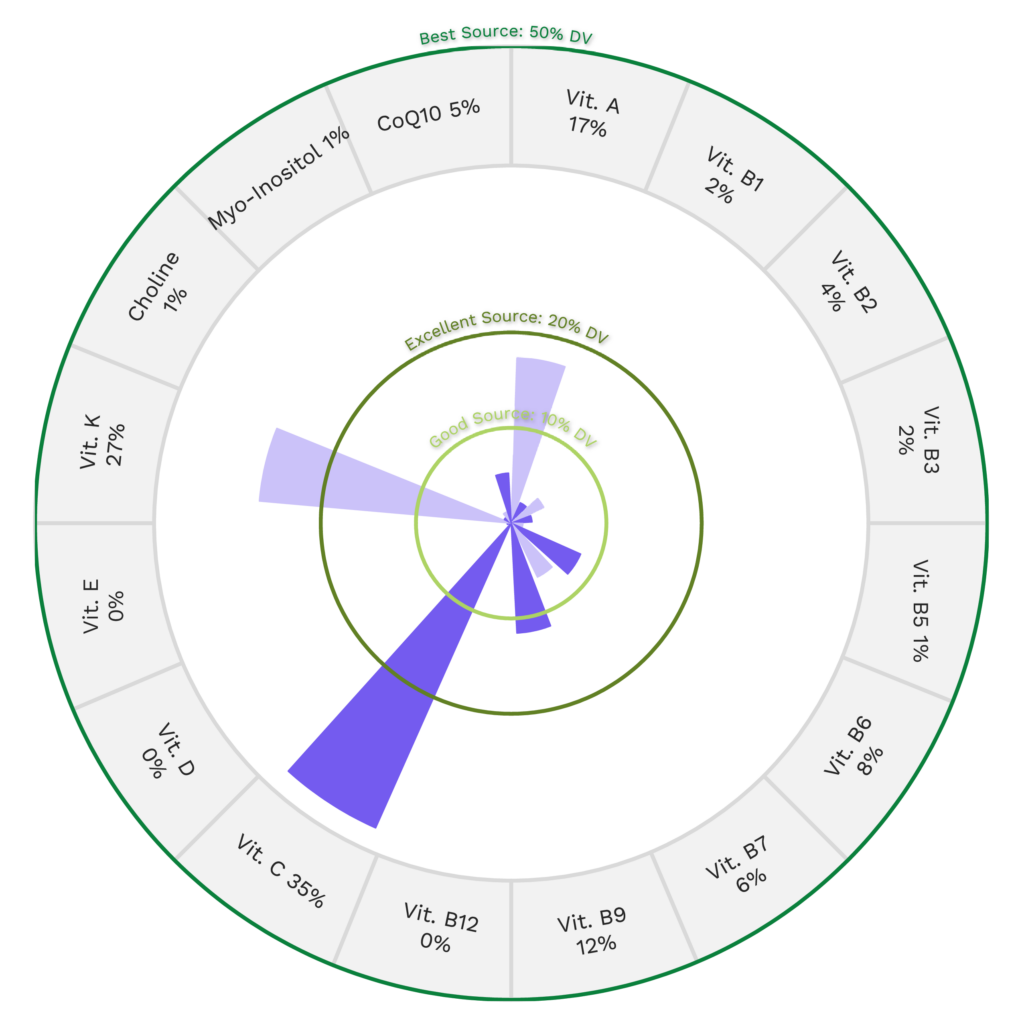
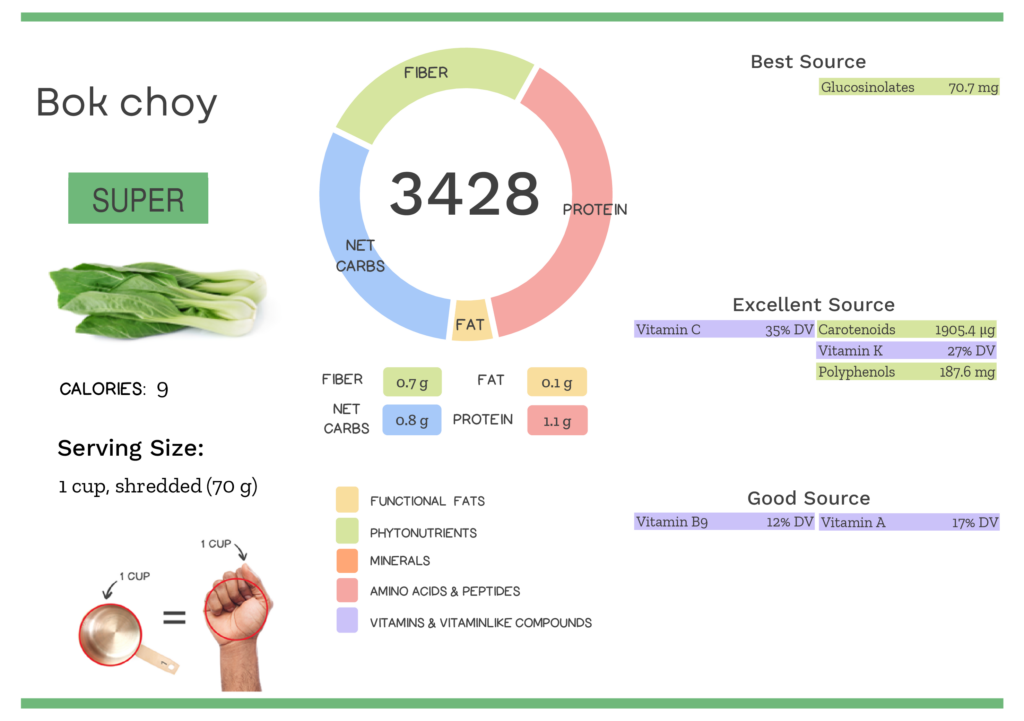
Bok Choy Nutrition Varies With Cooking
The Nutrivore Score for bok choy varies depending on the method of preparation.
| NUTRIVORE SCORE | |
|---|---|
| Bok choy, cooked, boiled, drained, with salt | 3213 |
| Bok choy, cooked, boiled, drained, without salt | 3213 |
| Bok choy, raw | 3428 |
Does this info make you want to jump for “choy”? Maybe your friends will too!
Health Benefits of Bok Choy Nutrients
Let’s take a closer look at all of the best and excellent source of nutrients found in a 1-cup serving of bok choy and see how they benefit our health.
Bok Choy Provides 70.7 mg of Glucosinolates
Bok choy is an outstanding source of glucosinolates, providing a whopping 70.7 mg of glucosinolates per 1-cup serving!
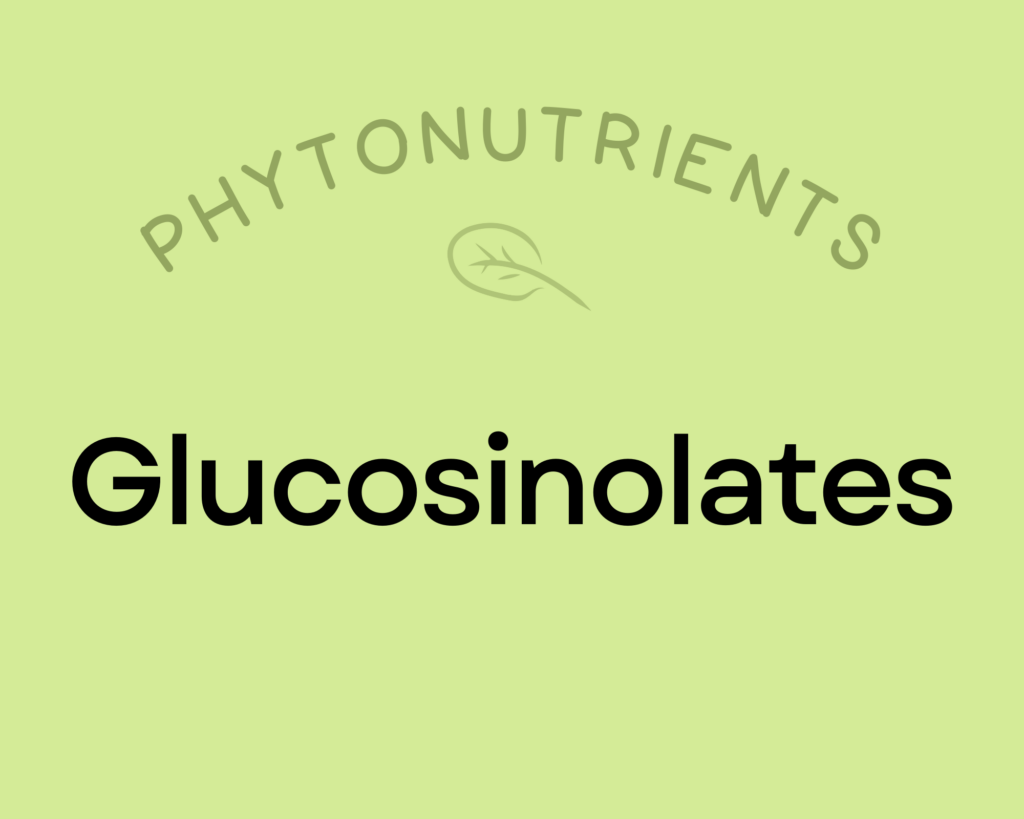
Glucosinolates are well-studied sulfur-containing compounds which break down into bioactive isothiocyanates and indoles when vegetables are damaged (via chewing, cutting, or other processing).
Isothiocyanates (like sulforaphane) are absolute rock stars as far as human health is concerned! Research spanning human epidemiology, animal models, and in vitro experiments show that dietary isothiocyanates are inversely associated with bladder cancer, lung cancer, colon cancer, breast cancer, and pancreatic cancer; some evidence also suggests they may be able to improve ventricular function following heart attacks.
Indoles also have powerful cancer prevention benefits through multiple mechanisms that include modulation of phases I and II detoxification enzymes, regulation of cell cycle arrest, control of cell growth, induction of apoptosis, antioxidant activity, anti-angiogenic effects, and epigenetic regulation. Indole-3-carbinol breaks down into 3,3′-Diindolylmethane (DIM), which is known for its anti-inflammatory, immune system modulating, cancer prevention and estrogen metabolism benefits.
Learn more about glucosinolates here.
Bok Choy Provides 35% DV Vitamin C
Bok choy is an excellent source of vitamin C, providing 35% of the daily value per 1-cup serving.
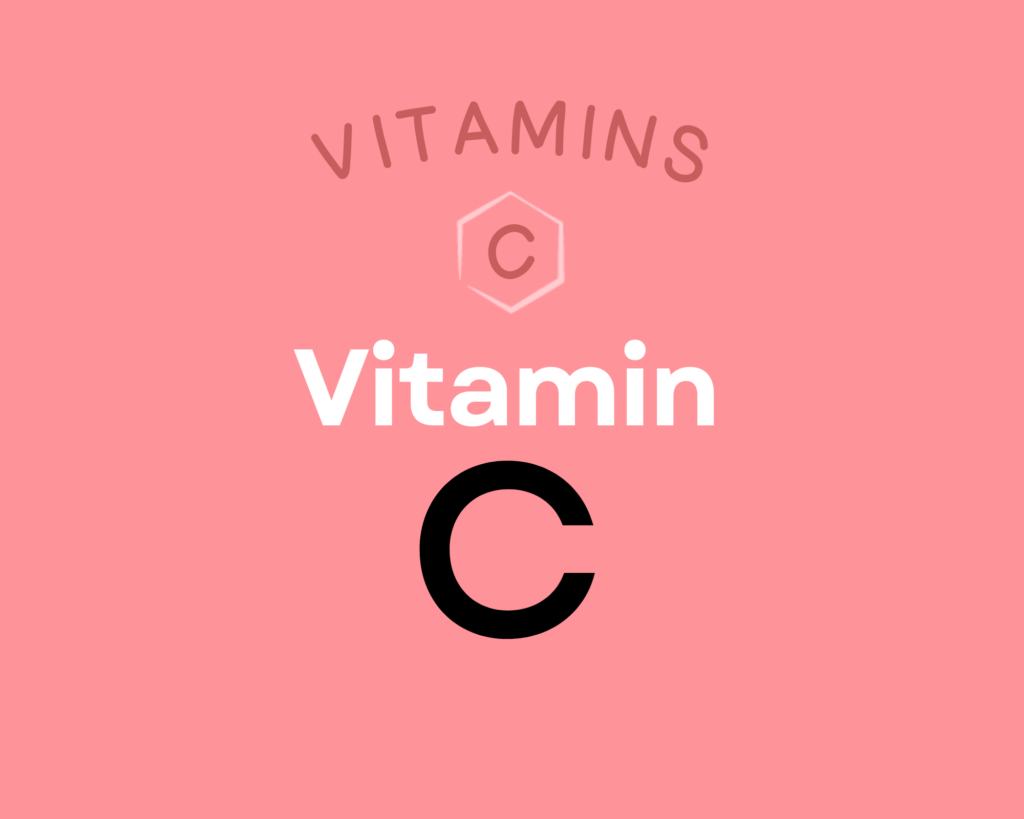
Vitamin C is a water-soluble vitamin that has powerful antioxidant properties (meaning it can help combat oxidative damage from free radicals and reactive oxygen species) and that serves as an enzyme cofactor (meaning it’s needed for enzymes to do their job, for example vitamin C is necessary for collagen synthesis, which is essential for bones, joints, teeth, blood vessels, skin and eyes) and playing important roles in immune system and skin health. Higher intakes of vitamin C are linked to reduced risk of heart disease, some forms of cancer, type 2 diabetes, cataracts, age-related macular degeneration, and gout. Vitamin C can also help regulate the stress response and reduce anxiety, and there’s preliminary evidence that it may also help prevent Alzheimer’s disease. Learn more about vitamin C here.
Bok Choy Provides 27% DV Vitamin K
This leafy crucifer is also an excellent source of vitamin K, providing 27% of the daily value per 1-cup serving.
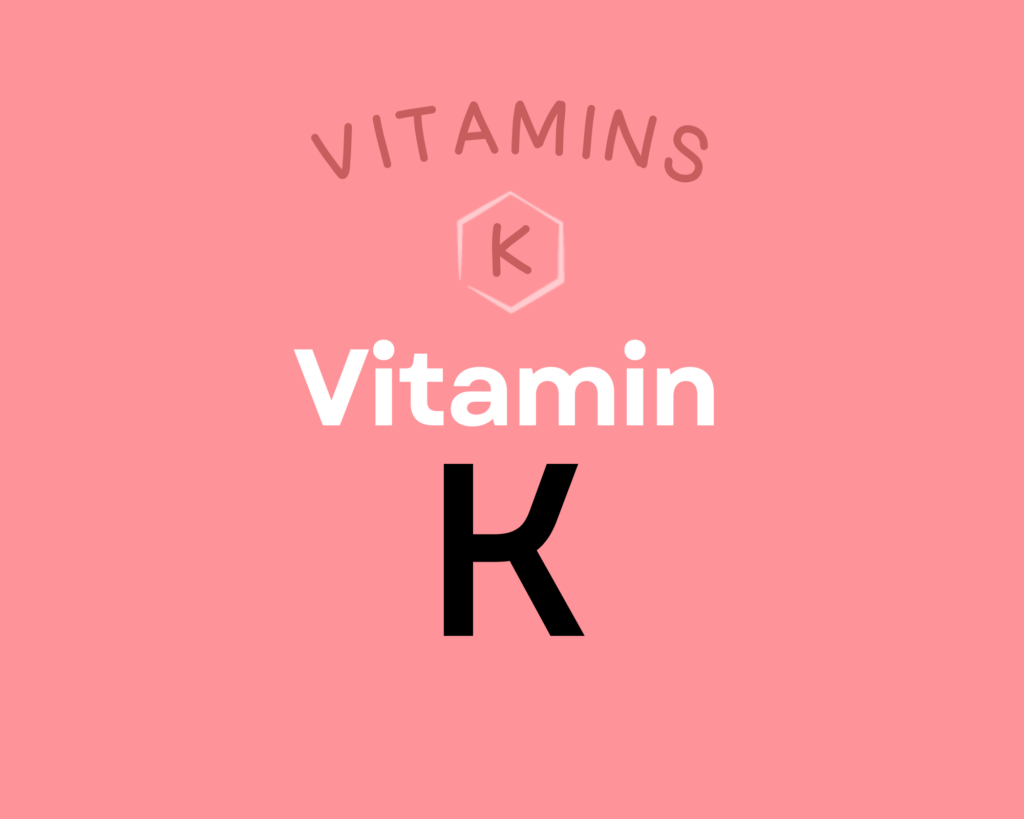
Vitamin K is actually a group of fat-soluble vitamins with a similar molecular structure, existing as K1, multiple isoforms of K2, and the synthetic form K3. This nutrient plays a vital role in coagulation, due to serving as a cofactor for proteins needed for blood clotting; it’s also essential for bone metabolism, cellular function, and the prevention of soft tissue calcification. Getting enough vitamin K2 can help protect against cardiovascular disease, may improve bone mineral density and skeletal health, and may even support endocrine function and brain health; there’s also some limited evidence it has anti-cancer and anti-inflammatory properties. Learn more about vitamin K here.
Bok Choy Provides 187.6 mg of Polyphenols
Bok choy is an excellent source of polyphenols, providing 187.6 mg of polyphenols per 1-cup serving.
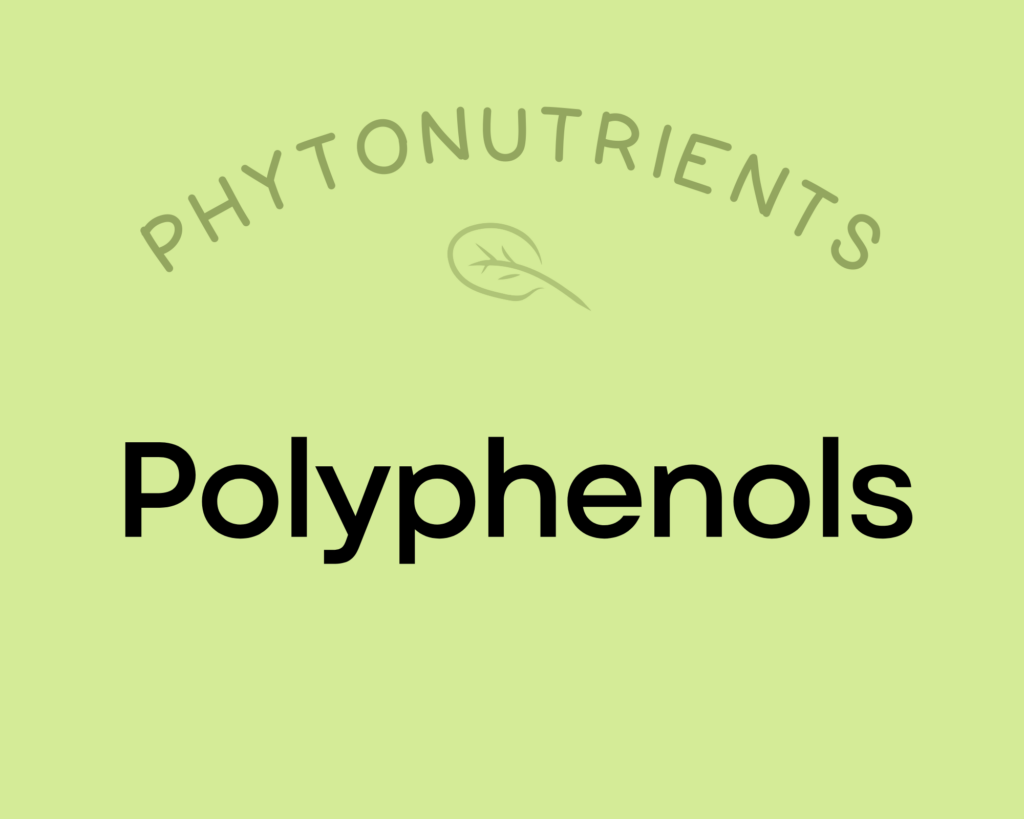
Polyphenols play a huge role in protecting against cancer, heart disease, diabetes, asthma, osteoporosis, neurodegenerative diseases, and other conditions associated with oxidative stress. In fact, a major reason foods like red wine and olive oil (as well as diets rich in both, such as the Mediterranean diet) show up as so beneficial may be due to their high polyphenol content! Along with chronic diseases, supplementing with polyphenols has been shown to protect against infections and reduce the signs of aging. Polyphenols exert their most potent effects by acting as antioxidants—preventing cellular damage by neutralizing hazardous oxygen radicals and improving cellular health as a result (which, in turn, benefits virtually every system in the body). As a result of their antioxidant properties, polyphenols also boost the immune system and protect against both chronic and acute diseases. In addition, polyphenols can help regulate enzyme function, stimulate cell receptors, modulate the functions of inflammatory cells (including T and B lymphocytes, macrophages, platelets, and natural killer cells), alter adhesion molecule expression, affect nerve cells and cardiac muscle cells, and exert antiviral effects. Learn more about polyphenols here.
Bok Choy Provides 1905.4 μg of Carotenoids
Bok choy is rich in carotenoids. Per 1-cup serving, this veggie provides 1905.4 μg of carotenoids.
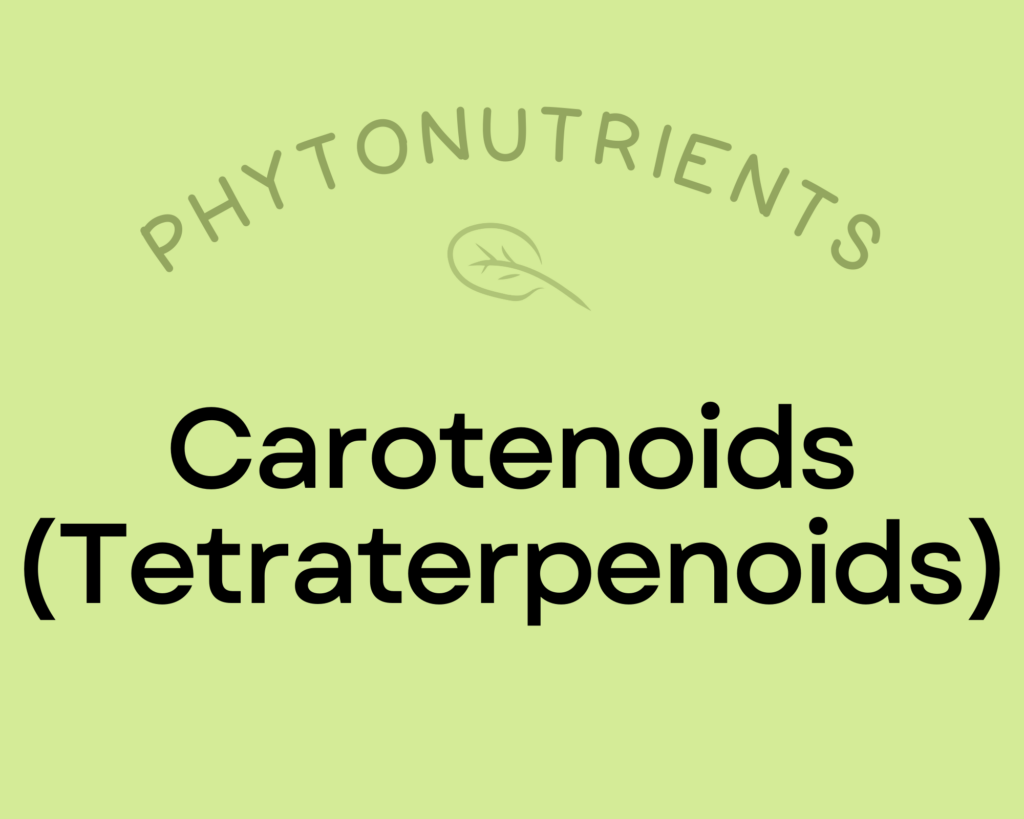
Carotenoids are a diverse group of phytonutrients that are responsible for giving fruits and vegetables vibrant red, orange, and yellow pigmentation. They were one of the earliest phytonutrients ever investigated by scientists (with research dating back to the 1800s!). Across studies, eating foods high in carotenoids appears to reduce the risk of head and neck cancers, supports vision health (particularly age-related eye diseases), may protect against metabolic syndrome and diabetes, and can reduce inflammation. Carotenoids have strong antioxidant properties, and help facilitate communication between cells by promoting the synthesis of connexin proteins, which create gap junctions in cell membranes that allow small molecules to be exchanged (which is part of how cells “talk” to each other!). Consuming carotenoids with fat significantly increases their absorption. Learn more about carotenoids here.
Learn What Foods Are the Best Sources of Every Nutrient
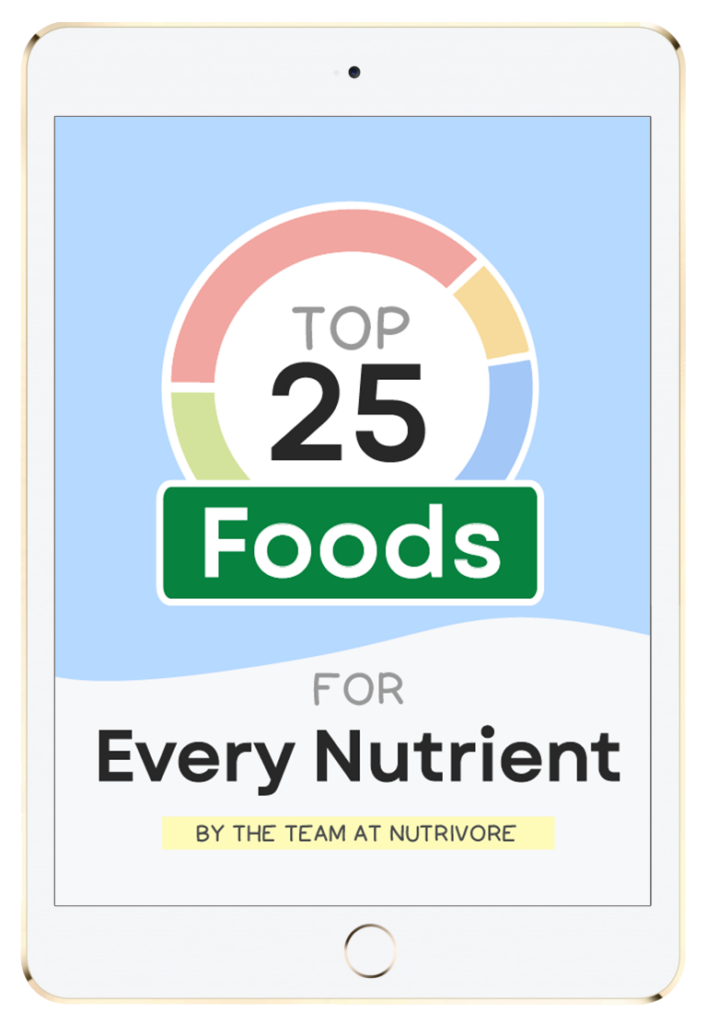
The Top 25 Foods for Every Nutrient
The Top 25 Foods for Every Nutrient e-book is a well-organized, easy-to-use, grocery store-friendly guide to help you choose foods that fit your needs of 43 important nutrients while creating a balanced nutrient-dense diet.
Get two “Top 25” food lists for each nutrient, plus you’ll find RDA charts for everyone, informative visuals, fun facts, serving sizes and the 58 foods that are Nutrient Super Stars!
Buy now for instant digital access.
How Much Bok Choy Should We Eat Per Day?
You know the old aphorism, a Brassica vegetable a day keeps the doctor away! Wait, that’s not how it goes? It should be!
Every serving of fresh, whole vegetables or fruit we eat daily reduces the risk of all-cause mortality by 5% to 8%, with the greatest risk reduction seen when we consume five or more servings per day. In fact, consuming 800 grams of vegetables and fruits daily reduces all-cause mortality by 31% compared to eating less than 40 grams daily. A 2017 meta-analysis showed that 2.24 million deaths from cardiovascular disease, 660,000 deaths from cancer, and 7.8 million deaths from all causes could be avoided globally each year if everyone consumed 800 grams of veggies and fruits every day.
Eating vegetables and fruit in abundance lowers risk of cancer, cardiovascular disease, type 2 diabetes, obesity, chronic kidney disease, osteoporosis and bone fragility fractures (including hip fracture), cognitive impairment and dementia (including Alzheimer’s disease), neurodegenerative diseases, asthma, allergies, chronic obstructive pulmonary disease, age-related macular degeneration, cataracts, glaucoma, depression, ulcerative colitis and Crohn’s disease, rheumatoid arthritis, inflammatory polyarthritis, non-alcoholic fatty liver disease, acne, seborrheic dermatitis, and lowers markers of inflammation. Learn more in Importance of Vegetables and Fruit.
Covering half of your plate with a variety of vegetables (and three quarters of your plate if your starchy food is a root vegetable or winter squash) at each meal is a simple way to easily achieve the goal of 5 or more servings of vegetables daily.
Studies show that, for every 100 grams of cruciferous veggies (like bok choy), we eat daily, all-cause mortality decreases by 24%! It’s always best to mix up the veggies you eat day to day (aiming for a wide variety of different vegetables and fruits throughout the week), and bok choy definitely has a place at the table.
Easily track your servings of Nutrivore Foundational Foods!
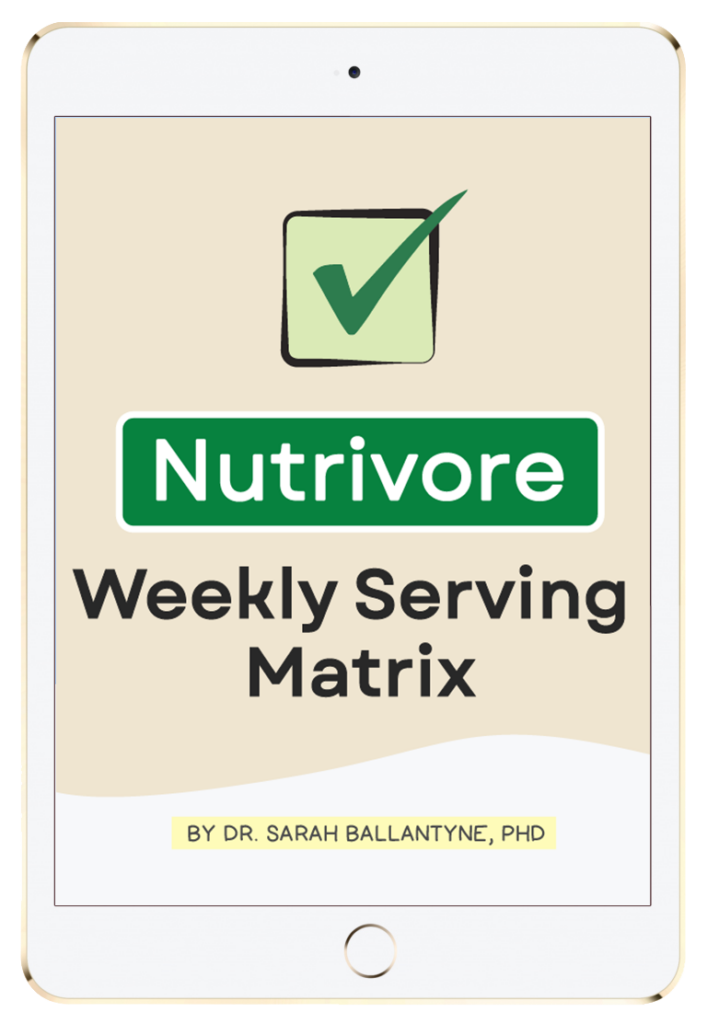
The Nutrivore Weekly Serving Matrix
The Nutrivore Weekly Serving Matrix digital resource is an easy-to-use and flexible weekly checklist designed to help you maximize nutrient-density and meet serving suggestions of Nutrivore foundational foods, all without having to weigh or measure your foods!
Includes a 22-page instructional guide and downloadable interactive guides.
Buy now for instant digital access.
Citations
Expand to see all scientific references for this article.
Clements RS Jr, Darnell B. Myo-inositol content of common foods: development of a high-myo-inositol diet. Am J Clin Nutr. 1980 Sep;33(9):1954-67. doi: 10.1093/ajcn/33.9.1954. PMID: 7416064.
Han JH, Yang YX, Feng MY. Contents of phytosterols in vegetables and fruits commonly consumed in China. Biomed Environ Sci. 2008 Dec;21(6):449-53. doi: 10.1016/S0895-3988(09)60001-5. PMID: 19263798.
Phenol-Explorer: Pak choy, raw
Possenti, M, Baima S, Raffo A, Durazzo A, Giusti AM, Natella F. Glucosinolates in Food. Glucosinolates. 2016. 1-46. doi: 10.1007/978-3-319-26479-0_4-1.
Pravst I, Zmitek K, Zmitek J. Coenzyme Q10 contents in foods and fortification strategies. Crit Rev Food Sci Nutr. 2010 Apr;50(4):269-80. doi: 10.1080/10408390902773037. PMID: 20301015.
USDA Food Central Database: Cabbage, chinese (pak-choi), raw
Watanabe T, Kioka M, Fukushima A, Morimoto M, Sawamura H. Biotin content table of select foods and biotin intake in Japanese. Int J Anal Bio-Sci. 2014. Vol 2(4):109-125.


